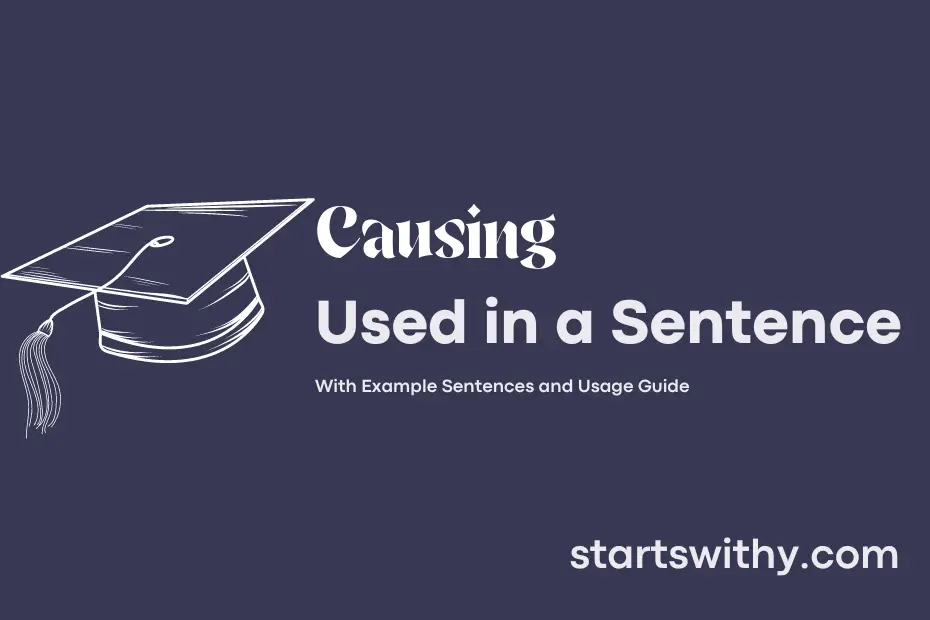Have you ever wondered how to construct an example sentence with the word “causing”? “Causing” is a verb that means to make something happen or bring about a particular result.
When you use “causing” in a sentence, you are indicating that one action or condition is responsible for another. Whether it’s explaining a chain of events or pinpointing the source of a problem, incorporating “causing” allows you to clearly express causation in your writing.
7 Examples Of Causing Used In a Sentence For Kids
- Causing a mess in the classroom is not a good idea.
- Remember, causing harm to others is not kind.
- Causing loud noise can disturb others around you.
- By causing fights, we hurt our friends’ feelings.
- Causing accidents can be dangerous, so be careful.
- Causing trouble can get you into trouble with your teacher.
- Causing damage to school property is not allowed.
14 Sentences with Causing Examples
- Causing poor time management skills, late submission of assignments has become a common problem among college students in India.
- The lack of access to quality study materials is causing difficulty for many college students in understanding complex concepts.
- Causing distress among students, frequent power outages have disrupted online classes in several colleges.
- The overload of assignments and exams is causing stress and burnout among college students in India.
- A lack of proper guidance from professors is causing confusion among college students regarding their career paths.
- The rising cost of education is causing financial strain on many college students in India.
- Inadequate sleep and irregular eating habits are causing health issues among college students.
- Causing distraction, the constant use of social media during study hours is hindering academic performance.
- The absence of mental health resources on campus is causing a rise in anxiety and depression among college students.
- The limited availability of internships and job opportunities is causing concern among college students about their future prospects.
- The outdated curriculum is causing a lack of interest and engagement among college students in their academic studies.
- The continuous pressure from family and society to excel academically is causing a sense of inadequacy among college students.
- The lack of proper infrastructure in colleges is causing inconvenience and discomfort to students during classes.
- Causing procrastination, the fear of failure is hindering many college students from completing their tasks on time.
How To Use Causing in Sentences?
To use the word “Causing” in a sentence, you must first understand its meaning and proper context.
Causing is a verb that means to make something happen or bring about a certain result. It is typically used to show a cause-and-effect relationship between two events or actions.
When using “Causing” in a sentence, keep in mind that it is usually followed by the effect or result that is being produced. For example:
- The heavy rain was causing flooding in the streets.
- Her reckless driving was causing accidents on the highway.
- The loud music next door is causing a disturbance.
To construct a sentence with “Causing,” you can follow this simple formula: Subject + Verb + Object + “Causing” + Result.
It is important to note that “Causing” is a present participle form of the verb “Cause.” This means it is generally used in the present tense to describe ongoing actions or situations.
By following these guidelines and practicing, you can effectively incorporate the word “Causing” into your writing to clearly convey the cause-and-effect relationship between different events or actions.
Conclusion
In conclusion, the examples of sentences using the keyword “causing” demonstrate how this verb can expeditiously convey the action of one thing leading to another. Whether it’s describing a physical effect like a medical condition causing discomfort or a behavioral consequence, such as stress causing mood swings, the word “causing” succinctly encapsulates the root of a problem or result. This simple but impactful verb helps in clearly connecting the cause and effect relationship, making sentences more concise and direct.
By using “causing” in sentences, writers can efficiently communicate the direct influence one event or factor has on another, enhancing the clarity and coherence of their writing. It serves as a powerful tool to emphasize the relationship between actions and their repercussions, making the message easily understandable for readers. Overall, the use of “causing” proves to be an effective way to convey causation in a straightforward manner.



